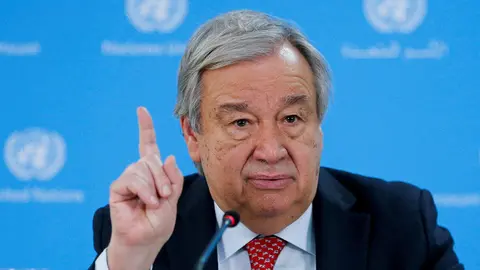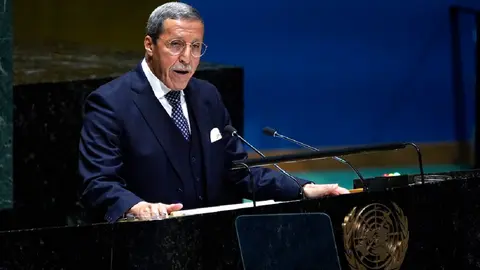Africa Watch reiterates denunciation of rights violations in Tindouf camps

The African Organisation for Human Rights Watch (Africa Watch) wrote to Staffan de Mistura, special envoy of the UN Secretary General for Western Sahara, to underline its "determination to reactivate the negotiating and political track to find a solution to the conflict in Western Sahara which would put an end to the tragedy of the Saharawis".
The coalition of Saharawi NGOs has thus formally presented itself to Staffan de Mistura in order to consolidate and continue the establishment of multiple levels of cooperation and understanding between entities and to facilitate the defence of human rights in the Western Sahara region and the Saharawi refugee camps in Tindouf.
Africa Watch has sent this letter to the UN Secretary General's Special Envoy on the occasion of his visit to Western Sahara and the preparation of the UN Secretary General's annual report on the situation in Western Sahara, to express its views on the conflict and to engage in re-launching negotiations to help find a human rights solution, as well as on issues related to the complexity of the conflict, which affect the achievement of any positive developments in the future.
Africa Watch reiterates in this regard its denunciation of the alleged human rights violations against the Saharawis in the Tindouf refugee camps, settlements for which the Polisario Front and Algeria are responsible, as they are on Algerian territory.

The letter sent by Africa Watch to Staffan de Mistura is reproduced below:
His Excellency Mr. Staffan de Mistura
Personal Envoy of the United Nations Secretary-General for Western Sahara
On behalf of the African Organization for Human Rights Watch (Africa Watch), the International Network for Human Rights and Development and Defenders for Human Rights, we highly appreciate your determination, Mr. Personal Envoy of the Secretary-General, to revive the negotiating and political path to find a solution to the Western Sahara conflict that ends the tragedy of the Sahrawis, which has lasted for five decades without a solution, Without hope emerging to end the state of fragmentation that has torn the Sahrawis apart.
The lack of any progress in the search for a just and lasting political solution to the conflict over Western Sahara has left the field open for the reproduction of the causes of fueling the conflict, the spread of hate speech and hatred among Sahrawis, and the rise in tension in the entire region, which indicates an extension of the conflict indefinitely, and aggravation of the situation of the people of Western Sahara, dismembering them and preventing families from meeting again on both sides of the security wall, and the frequent occurrence of serious human rights violations in the Tindouf camps, as a result of popular pressure and the continuous protest action of the camp residents, due to the widespread manifestations of violence in the Tindouf region and inside the camps and the targeting of Polisario security personnel and some Algerian army leaders against Opponents of the policies of the Polisario Front, as well as Sahrawi civil society activities, including human rights defenders, activists and youth movements, were subjected to repression and attempts to silence them, because of their demands to fight corruption inside the camps and to demand clarifications regarding the position of the Polisario Front on the implementation of Security Council resolutions stipulating the necessity of searching for a compatible political solution to the issue of Western Sahara.
The coalition of non-governmental organizations that signed this letter recorded many serious violations during the past five years, in the Sahrawi camps in Tindouf, ranging from extrajudicial killings, enforced disappearances, and prolonged torture, the last of which was a month before the announcement of your visit to the Laayoune city, as a result of the actions of members of the security forces of Polisario on the kidnapping of civil activist Mohamed Salem Ould Maa El Ainine Ould Assouid, as a result of his exposure of the theft and smuggling of humanitarian aid directed to camp residents.
The preponderance of convictions regarding the outcome of the Western Sahara conflict requires all stakeholders involved in the conflict to create an atmosphere of trust and peace that supports freedom of expression, opinion, assembly, and the examination of multiple options that allow the search for decent means of living on the land of Western Sahara, without diving into the maze of rigid positions of some parties to the conflict called for the necessity of holding a self-determination referendum, and the field experience of MINURSO and previous special representatives has demonstrated the impossibility of holding it, due to the host state’s unwillingness to allow the registration and census of Sahrawis present on its territory to determine who is descended from the territory of Western Sahara, and who is not, and as a result granting legal status to refugees. For those whose status has been approved as displaced from the region and limiting the list of those entitled to vote in the referendum

The systematic rejection of Sahrawis living in the region during identification operations, the exclusion of entire tribal groups, due to the lack of broad representation for them in the camps, and the inclusion of other groups living in southern Algeria, northern Mauritania, and various regions of Mali as an attempt to drown out the regulations to be prepared, and the launching of tendentious media campaigns with the aim of influencing the convictions and positions of various groups of Sahrawis in Western Sahara, in the camps, and in the diaspora are involved in the conflict, which has made the possibility of holding a referendum seem closer to impossible than reality.
Accordingly, the coalition of non-governmental organizations decided to win a just political solution that guarantees the dignity of the Sahrawis on their land, ends their continued suffering, and guarantees their enjoyment of all the rights and freedoms stipulated in the basic international human rights conventions.
The coalition of non-governmental organizations, while rejoicing in announcing your visit to the Laayoune city in Western Sahara, once again confirms its commitment to your good endeavors to revive negotiations between all parties involved in the conflict, without preconditions, and its readiness to enter into a frank dialogue in good faith and with a high degree of realism to reach a solution that guarantees justice for the Sahrawis, reuniting their unity on their land, and working to build the lost trust between them as a result of the tensions of one of the parties to the conflict to perpetuate the crisis.
We, as Sahrawi human rights defenders, declare our readiness to meet with you, Mr. Personal Envoy, and exchange views in relation to the conflict and issues related to it, in order to convey the voice of independent civil society, disciplined by international standards and guidelines for work in the field of human rights. We consider the success of your mandate to be one of our goals and concerns in the Western Sahara region, Sahrawi camps.

We, in the coalition of Sahrawi Non-Governmental Organizations, consider that your tireless effort to revive the course of negotiations between the parties, to reach a final political solution to the conflict, is a last opportunity to put an end to a long-term conflict, from whose effects and remnants successive generations have suffered.
While the Sahrawis in the Western Sahara region enjoy all the rights and freedoms stipulated in Moroccan national legislation and international instruments regulating human rights, including political participation and democratic representation of the population, and supervision of the overall management of their local affairs, the residents of the Tindouf camps remain in complete isolation from any international protection, according to the International Refugee Convention and its Protocol, and in most European national legislation they are classified as stateless, because they do not have identification papers from the country hosting the camps or refugee cards that determine their legal status.
Based on our belief in the principles of equality and justice and the United Nations Charter stipulating that solutions to conflicts must be implemented through peaceful means that guarantee the interests and rights of those affected by them, and the necessity of taking appropriate measures to strengthen peace in the region, we support your steps, Mr. Personal Envoy of the Secretary-General of the United Nations, in examining the issue of resuming serious and sincere dialogue, to resolve the Western Sahara conflict, in a way that ensures healing the wounds of the Sahrawis and ending their long suffering with the state of fragmentation that has afflicted them since 1975, and the necessity of showing political realism and respecting the opinion of the majority of Sahrawis on the necessity of securing their stability in their land and working to find ways to provide their well-being, according to a management model that aspires to manage their affairs on on their own land, instead of detaining them in an area that does not have the minimum conditions for a decent life - and outside any international framework of protection, and in complete deprivation of the possibility of resorting to the national remedies of the country hosting the camps, and the continuing series of plundering and smuggling of international humanitarian aid directed to the camps, despite its limited amount.
Our work in the field of protecting and promoting human rights in the region has strengthened our conviction of the necessity of raising issues and cases of grave violations in the Tindouf camps, whether it concerns groups of Sahrawis residing in the camps, prisoners of war, political prisoners, activists and human rights defenders, who still complain about the lack of Shedding light on its merits, because international mechanisms for the protection of human rights, whether treaty bodies or extra-conventional mechanisms, have not been able to bridge cooperation mechanisms with the Algerian authorities, as the country hosting the camps, because the growing feelings of anger among the Sahrawis have continued to become more intense for not seeking redress and apologizing to them for the harm they suffered violations by a non-state actor who continued to abuse them outside the radar of any significant international protection and with the direct authorization of the government of the host country.

The coalition of non-governmental organizations places high hopes on the efforts of the Personal Envoy of the Secretary-General, Mr. Staffan de Mistura, to move the negotiating wheel again to end the conflict and pave the way for political solutions that respond to the desires and aspirations of the Sahrawis for stability, development and living on their land, according to a combination of measures that respect their privacy, culture and way of life, amid the cohesion and harmony of the other components of the Maghreb mosaic, which has been affected by the opportunities for security and development for decades due to the continuation of the conflict for geopolitical reasons within the framework of the regional scramble between the region’s powers for regional leadership.
While we reaffirm the readiness of the members of the coalition of non-governmental organizations to contribute seriously to overcoming the obstacles to opening a serious and realistic dialogue with the components of Sahrawi civil society, regarding the search for a just and realistic solution to the conflict, we renew our openness to the efforts of the Personal Envoy to search for a final solution to the conflict and we welcome any call for dialogue and to express our opinions and positions on the entire issue.
In conclusion, accept the utmost respect and appreciation, His Excellency the Personal Envoy of the Secretary-General of the United Nations, Staffan de Mistura.
Abdelouahab Gain Brahim Lahcen Oublal Dr. Amina Laghazal
Africa Watch International Network for Human Defenders for
Rights and Development Human Rights










